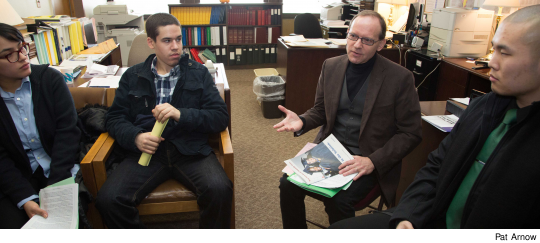 |
As Clarion went to press, the New York State budget was the focus of a down-to-the-wire fight, and the outcome – for CUNY funding and for the budget as a whole – was hard to predict.
The starting point for the State budget process is the governor’s executive budget proposal. Governor Andrew Cuomo’s budget plan, released in January, called for large tax breaks for New York’s big banks and corporations – but failed to fund nearly $50 million of CUNY’s mandatory cost increases. The underfunding of CUNY’s expenses for heat, electricity, building rentals and more was one of many austerity measures that Cuomo proposed in order to pay for his tax-cut plan.
“By siphoning off huge amounts of money into tax cuts for the wealthy, Cuomo’s budget forces everyone else into an austerity situation – competing for a small piece of the pie,” said PSC First Vice President Steve London.
Union Action
PSC members and CUNY students went to Albany in February and March to push for a progressive budget solution. And as budget negotiations entered their final days before the April 1 deadline, the union was among those fighting down to the wire, joining a March 21 rally at State Sen. Marty Golden’s office in Bay Ridge to demand he drop his support for tax cuts for the rich.
Budget proposals from the New York Assembly and the State Senate initially looked somewhat better for CUNY – but on the State Senate side, those numbers were not backed by any real funding plan. The Senate’s budget bill was widely criticized as a “wish list” designed to appease constituents, while approving tax breaks for the rich that would have to be paid for by deep budget cuts in the future.
At press time, the total amount of revenue that will actually be available in this year’s State budget was very much up for grabs, and that conflict could have a bigger impact on CUNY funding than the number in any paper plan.
Cuomo’s tax cuts ranged from eliminating a bank tax worth about $300 million per year, to reducing the corporate tax rate from 7.1% to 6.5% (more than $300 million annually), to slashing the estate tax at a cost of nearly $200 million per year.
The Assembly’s budget plan went along with eliminating the bank tax, but did not give Cuomo his corporate tax reduction. While State Sen. Jeff Klein, leader of the breakaway Independent Democratic Caucus, had announced that the Senate’s budget bill would not eliminate the bank tax, the actual text of the Senate’s bill said otherwise. The Senate’s bill was in fact full of tax breaks for the wealthiest New Yorkers, including a sales tax reduction for those who buy private planes.
Meanwhile, conflicts raged in Albany over a host of issues related to economic inequality: Mayor Bill de Blasio’s universal pre-K plan; reform of New York’s Tuition Assistance Plan (see Clarion, February 2014); the NYS Dream Act; a charter school power grab and more. The intensity of the clashes reflected what the website Politico summed up as “the 1% fight[ing] back hard” against the progressive momentum coming out of November’s NYC elections.
Republicans for Cuomo
When Politico interviewed billionaire Ken Langone, founder of Home Depot and head of Republicans for Cuomo, he compared critics of rising economic inequality to “what Hitler was saying in Germany,” which he summed up as a politics of “envy” and “jealousy.” Langone had most recently been in the news for saying that Pope Francis should back off on his criticisms of excessive wealth.
A wide coalition of economic-justice groups, from the Alliance for Quality Education to the New York Labor-Religion Coalition, called on Cuomo “to repudiate [these] remarks by Ken Langone” and to return Langone’s political donations. The governor, however, declined to do so.

